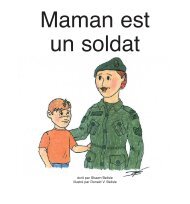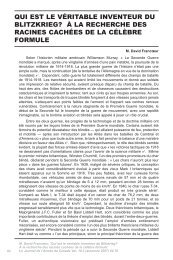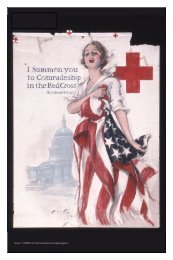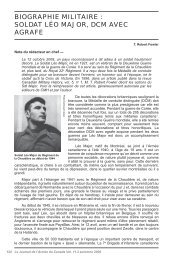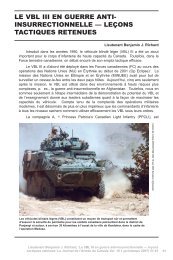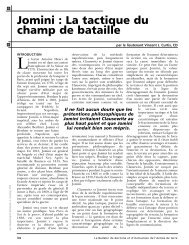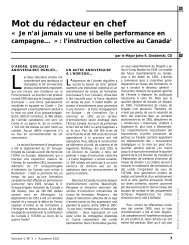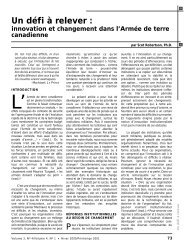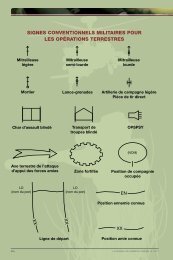The Canadian Army Journal
The Canadian Army Journal
The Canadian Army Journal
Create successful ePaper yourself
Turn your PDF publications into a flip-book with our unique Google optimized e-Paper software.
His dispassionate analysis of the battle is grounded by his intimate knowledge of land<br />
warfare. An ex-officer of the Royal Gurkha Rifles, his writing reflects his experience with<br />
interpretation of ground, how command and control may affect a battle, as well as how<br />
tactical innovation may determine the outcome of an engagement.<br />
In the summer of 1915, General Joffre and the French high command requested<br />
that the BEF engage the German armies on the left flank of the French Tenth <strong>Army</strong><br />
(General d’Urbal) when it launched its own offensive against Artois. Not seen as a major<br />
player given that the French were attacking at Artois and Champagne with three full<br />
armies, nevertheless the smaller British force was asked to apply pressure against the<br />
Germans around the grouping of industrial towns centered on Loos. A detailed<br />
reconnaissance of the ground by the BEF generals determined that it was the worst<br />
possible place from which to launch an attack against heavily defended German<br />
positions. <strong>The</strong>ir answer back to the French was simply, no.<br />
Strange how the politics of coalitions will often supercede common military sense,<br />
and despite it being an unwanted battle fought on unfavourable ground, the British<br />
conceded to French pressure and launched an assault towards Loos on September 25th<br />
and embarked on a battle that would effectively spell the end of what little remained of<br />
Britain’s contemptible little army.<br />
Though officially the battle ended on October 8th, Corrigan completes an analysis<br />
of the entire period of fighting through to November 4th, when the Commander of the<br />
BEF’s First <strong>Army</strong> (Haig) informed his commander in chief, Sir John French that he could<br />
do no more. For a sideshow, Corrigan points out that the Battle of Loos cost the BEF<br />
16,000 casualties, and he has done a remarkable job of detailing the casualties suffered<br />
as the battle progresses. As one reads the book, you can almost sense the draining<br />
away of the BEF’s strength. From a student’s perspective, this battle provides an<br />
excellent case study of the necessity for fire support and reserves, and how critical<br />
timing becomes when committing these assets to battle.<br />
Corrigan also makes note of several interesting aspects to the battle. He highlights<br />
the level of leadership displayed. Several of the divisional and brigade commanders are<br />
killed or wounded in action. He spends time exploring the fate of a famous son, that of<br />
Rudyard Kipling the immortal bard of the British <strong>Army</strong>. Also worthy of note are the<br />
sections that explain the dynamic culture of the BEF and how it was composed–who<br />
filled the rank and file of the Guards, how the Territorial Force was mobilized, and new<br />
army divisions fared as they did.<br />
Above all else, one easily recognizes Corrigan’s comfort with his subject and his<br />
application of a soldier’s eye towards the events of the battle. At all times he is careful<br />
to remain dispassionate and objective, and examines the predicaments of the British<br />
attack in context. This approach leads to a solid and well researched book.<br />
<strong>The</strong> year 1915 is one of many lessons for the BEF, and Corrigan’s addition to the<br />
subject will certainly help examine these issues further. Well written and very readable,<br />
Loos 1915: <strong>The</strong> Unwanted Battle, is a recommended read for those interested in the<br />
First World War.<br />
<strong>Canadian</strong> <strong>Army</strong> <strong>Journal</strong> Vol. 11.1 Spring 2008 141


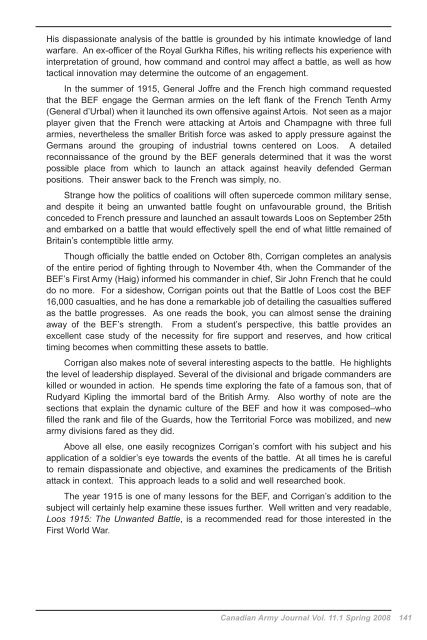
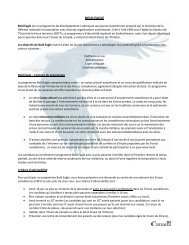
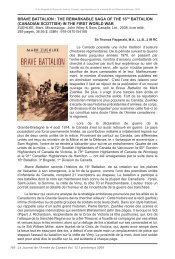
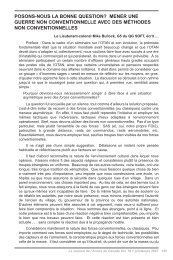
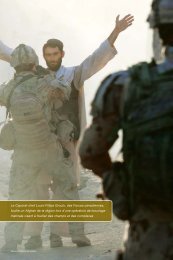
![La modularite dans l'Armee de terre canadienne [pdf 1.6 MB]](https://img.yumpu.com/17197737/1/188x260/la-modularite-dans-larmee-de-terre-canadienne-pdf-16-mb.jpg?quality=85)

